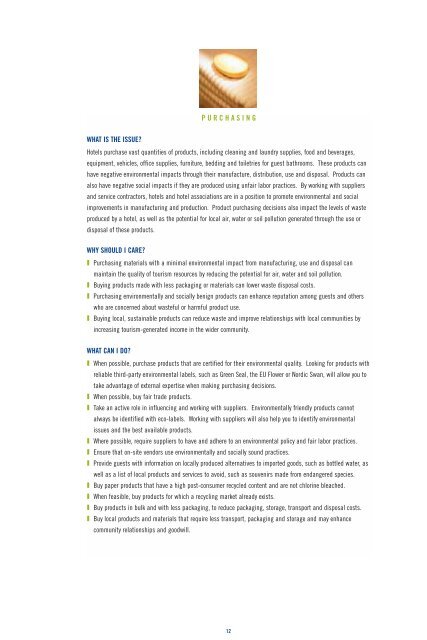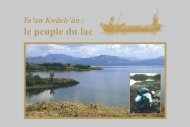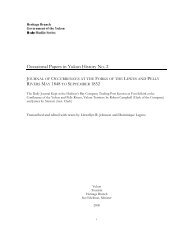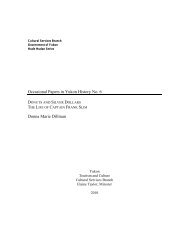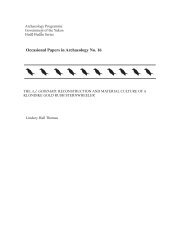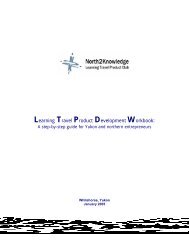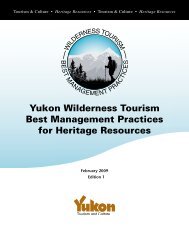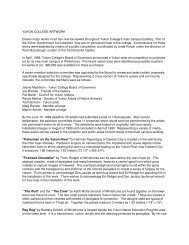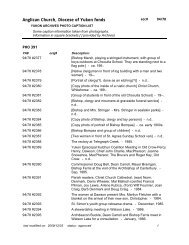a practical guide to good practice a practical guide to good practice
a practical guide to good practice a practical guide to good practice
a practical guide to good practice a practical guide to good practice
You also want an ePaper? Increase the reach of your titles
YUMPU automatically turns print PDFs into web optimized ePapers that Google loves.
WHAT IS THE ISSUE?<br />
P U R C H A S I N G<br />
Hotels purchase vast quantities of products, including cleaning and laundry supplies, food and beverages,<br />
equipment, vehicles, office supplies, furniture, bedding and <strong>to</strong>iletries for guest bathrooms. These products can<br />
have negative environmental impacts through their manufacture, distribution, use and disposal. Products can<br />
also have negative social impacts if they are produced using unfair labor <strong>practice</strong>s. By working with suppliers<br />
and service contrac<strong>to</strong>rs, hotels and hotel associations are in a position <strong>to</strong> promote environmental and social<br />
improvements in manufacturing and production. Product purchasing decisions also impact the levels of waste<br />
produced by a hotel, as well as the potential for local air, water or soil pollution generated through the use or<br />
disposal of these products.<br />
WHY SHOULD I CARE?<br />
I Purchasing materials with a minimal environmental impact from manufacturing, use and disposal can<br />
maintain the quality of <strong>to</strong>urism resources by reducing the potential for air, water and soil pollution.<br />
I Buying products made with less packaging or materials can lower waste disposal costs.<br />
I Purchasing environmentally and socially benign products can enhance reputation among guests and others<br />
who are concerned about wasteful or harmful product use.<br />
I Buying local, sustainable products can reduce waste and improve relationships with local communities by<br />
increasing <strong>to</strong>urism-generated income in the wider community.<br />
WHAT CAN I DO?<br />
I When possible, purchase products that are certified for their environmental quality. Looking for products with<br />
reliable third-party environmental labels, such as Green Seal, the EU Flower or Nordic Swan, will allow you <strong>to</strong><br />
take advantage of external expertise when making purchasing decisions.<br />
I When possible, buy fair trade products.<br />
I Take an active role in influencing and working with suppliers. Environmentally friendly products cannot<br />
always be identified with eco-labels. Working with suppliers will also help you <strong>to</strong> identify environmental<br />
issues and the best available products.<br />
I Where possible, require suppliers <strong>to</strong> have and adhere <strong>to</strong> an environmental policy and fair labor <strong>practice</strong>s.<br />
I Ensure that on-site vendors use environmentally and socially sound <strong>practice</strong>s.<br />
I Provide guests with information on locally produced alternatives <strong>to</strong> imported <strong>good</strong>s, such as bottled water, as<br />
well as a list of local products and services <strong>to</strong> avoid, such as souvenirs made from endangered species.<br />
I Buy paper products that have a high post-consumer recycled content and are not chlorine bleached.<br />
I When feasible, buy products for which a recycling market already exists.<br />
I Buy products in bulk and with less packaging, <strong>to</strong> reduce packaging, s<strong>to</strong>rage, transport and disposal costs.<br />
I Buy local products and materials that require less transport, packaging and s<strong>to</strong>rage and may enhance<br />
community relationships and <strong>good</strong>will.<br />
12


